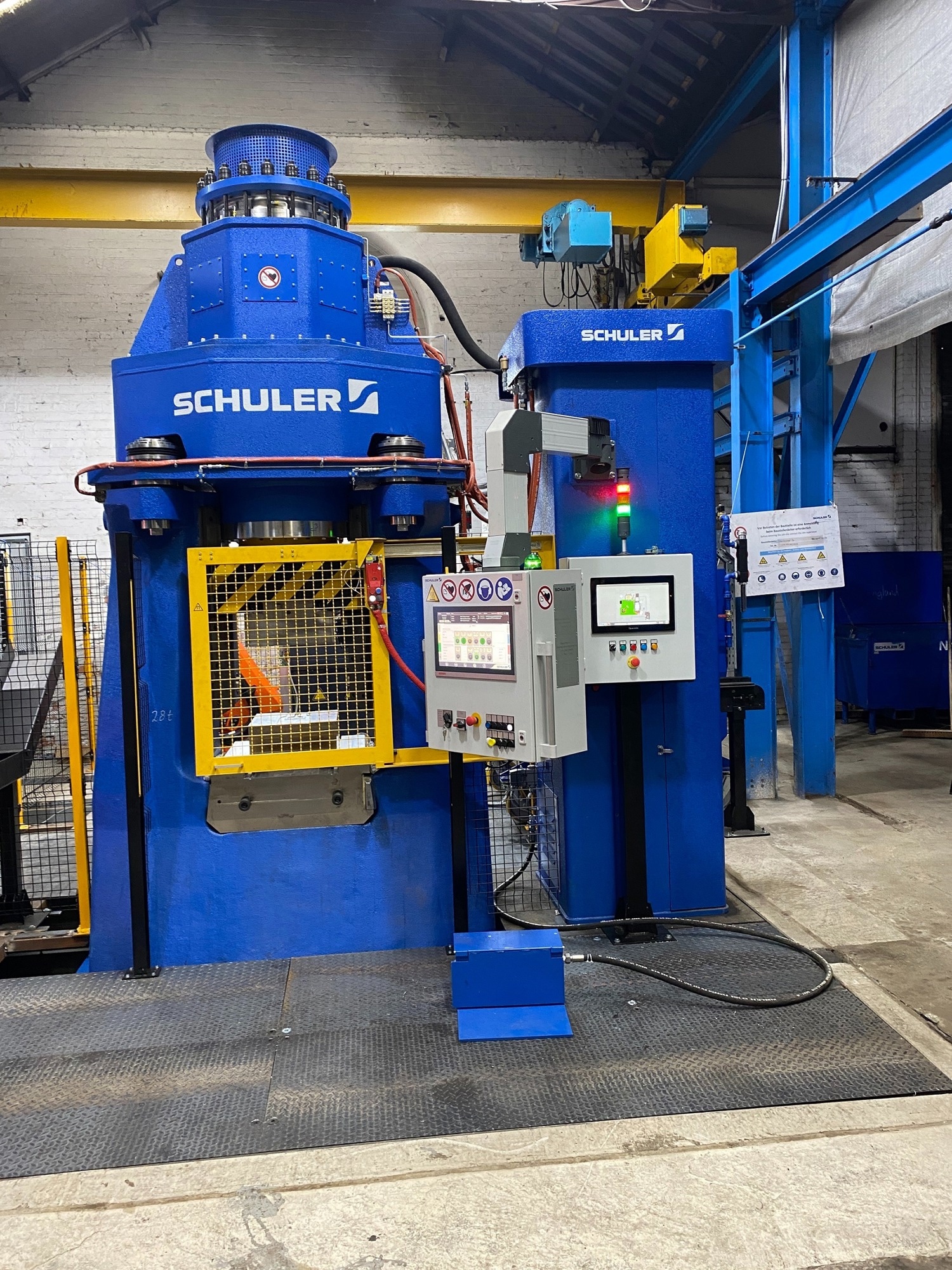Footprint Tools – one of the leading manufacturers of traditional hand tools in the UK – is at the heart of a research project that could see Sheffield spark a recycling revolution in industrial forging that unlocks a step change in the manufacture of safety critical components for the aerospace, defence and energy sectors using machining waste and state-of-the-art linear hammer technology.

A 'whole new level' the 1.4 million Schuler hammer installed at Footrprint tools. Image Credit: The University of Strathclyde’s Advanced Forming Research Centre
The Sheffield-based business with 12 employees and two robots traces its roots back to the 1760s but has always had its eyes firmly focused on the future. This week it unveiled the latest addition to its Admiral Works shopfloor: a £1.4 million state-of-the-art Schuler precision linear forge, the only one of its kind in the UK and one of only three in Europe.
As the centrepiece of an R&D partnership between the small family firm and two world-leading research institutions – The Henry Royce Institute (Royce) and the University of Strathclyde’s Advanced Forming Research Centre (AFRC), part of the National Manufacturing Institute Scotland Group – the equipment will help consolidate Sheffield and the UK’s lead in advanced forging manufacture.
Following a packed gathering of the AFRC’s Forging and Forming Forum, where the R&D venture was announced, Royce Professor Martin Jackson said he was delighted that the Servo technology hammer, initially destined for Manchester, had found a home in Sheffield, the hub of the UK’s forging and forming industry.
Professor Jackson added: “This raises forging technology to a completely new level. Our job at Royce and the AFRC is to take the knowledge we unlock from this R&D collaboration and roll it out to forging companies across the country, especially in the use of recycled machining waste such as titanium.
“Sheffield has more titanium waste than anywhere in the UK, yet we put it into the ferro-titanium as an alloy addition. It is too good of a material to do that. That’s why Sheffield is leading the way in a forging revolution around recycling, putting us at the forefront of rapid near-net shaping from recycled materials. We are well ahead of China and the United States, and this should enable us to extend that lead.
“Within a two-mile radius of where we are standing today, we can take waste material, rapidly consolidate it and forge it into near net shape parts that are not only made from recycled material but have properties far superior to other primary materials. Sheffield should be proud of that.”
The Head of Operations at the Advanced Forming Research Centre (AFRC), Dr Alastair Conway, said: “We are delighted to have helped create this unique research partnership. We have so much to learn from the Footprint Tools team and so much to gain from our collaborative research with Martin and his team at Royce as we take research out of academic institutions into the real world.
The accuracy of the linear hammer could help us create a step-change in the production of safety critical components in aerospace and related industries that have previously been nervous of hammer technology and the black arts often associated with its use.”
Richard Jewitt, Director of Footprint Tools said: “This is a big moment for a small company like us and for small and medium sized forgers across Sheffield and South Yorkshire. It gives our sector access to world-class equipment and world class R&D talents in two brilliant research teams. For firms like us in the region, this is an opportunity to develop more accurate and consistent processes, which could lead to more manufacturing reshoring and open new product export markets. There is a real sense of pride and excitement on the shopfloor that we are the home of this incredible venture.”
Dr Conway added: “People mistakenly think of forging as a technology of the past. It’s not. It’s a technology of the future. Next time you fly off on holiday, remember the two most important processes in aircraft manufacture are forging and machining. To generate the key properties in aero-structural and air engine material you need to forge. This is a huge opportunity for Sheffield to strike a hammer blow for the use of recycled materials in some of the biggest markets on the planet that need decarbonising.”
The AFRC is a globally recognised centre of excellence in innovative forging and forming technologies and is based near Glasgow Airport with an outreach office in Sheffield’s Olympic Legacy Park. It is part of the UK’s High Value Manufacturing (HVM) Catapult.